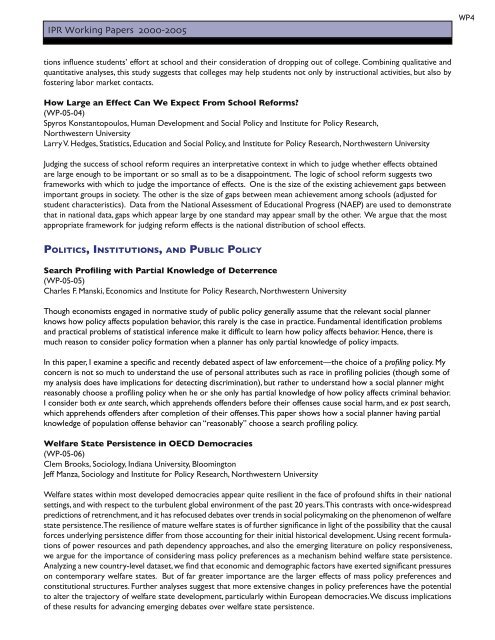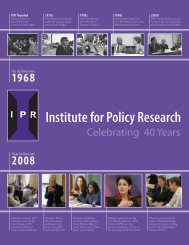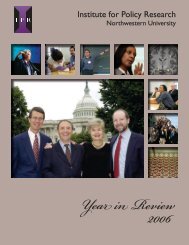Whatever Happened to the Emerging Democratic Majority?
Whatever Happened to the Emerging Democratic Majority?
Whatever Happened to the Emerging Democratic Majority?
Create successful ePaper yourself
Turn your PDF publications into a flip-book with our unique Google optimized e-Paper software.
IPR Working Papers 2000-2005<br />
WP4<br />
tions influence students’ effort at school and <strong>the</strong>ir consideration of dropping out of college. Combining qualitative and<br />
quantitative analyses, this study suggests that colleges may help students not only by instructional activities, but also by<br />
fostering labor market contacts.<br />
How Large an Effect Can We Expect From School Reforms?<br />
(WP-05-04)<br />
Spyros Konstan<strong>to</strong>poulos, Human Development and Social Policy and Institute for Policy Research,<br />
Northwestern University<br />
Larry V. Hedges, Statistics, Education and Social Policy, and Institute for Policy Research, Northwestern University<br />
Judging <strong>the</strong> success of school reform requires an interpretative context in which <strong>to</strong> judge whe<strong>the</strong>r effects obtained<br />
are large enough <strong>to</strong> be important or so small as <strong>to</strong> be a disappointment. The logic of school reform suggests two<br />
frameworks with which <strong>to</strong> judge <strong>the</strong> importance of effects. One is <strong>the</strong> size of <strong>the</strong> existing achievement gaps between<br />
important groups in society. The o<strong>the</strong>r is <strong>the</strong> size of gaps between mean achievement among schools (adjusted for<br />
student characteristics). Data from <strong>the</strong> National Assessment of Educational Progress (NAEP) are used <strong>to</strong> demonstrate<br />
that in national data, gaps which appear large by one standard may appear small by <strong>the</strong> o<strong>the</strong>r. We argue that <strong>the</strong> most<br />
appropriate framework for judging reform effects is <strong>the</strong> national distribution of school effects.<br />
Politics, Institutions, and Public Policy<br />
Search Profiling with Partial Knowledge of Deterrence<br />
(WP-05-05)<br />
Charles F. Manski, Economics and Institute for Policy Research, Northwestern University<br />
Though economists engaged in normative study of public policy generally assume that <strong>the</strong> relevant social planner<br />
knows how policy affects population behavior, this rarely is <strong>the</strong> case in practice. Fundamental identification problems<br />
and practical problems of statistical inference make it difficult <strong>to</strong> learn how policy affects behavior. Hence, <strong>the</strong>re is<br />
much reason <strong>to</strong> consider policy formation when a planner has only partial knowledge of policy impacts.<br />
In this paper, I examine a specific and recently debated aspect of law enforcement—<strong>the</strong> choice of a profiling policy. My<br />
concern is not so much <strong>to</strong> understand <strong>the</strong> use of personal attributes such as race in profiling policies (though some of<br />
my analysis does have implications for detecting discrimination), but ra<strong>the</strong>r <strong>to</strong> understand how a social planner might<br />
reasonably choose a profiling policy when he or she only has partial knowledge of how policy affects criminal behavior.<br />
I consider both ex ante search, which apprehends offenders before <strong>the</strong>ir offenses cause social harm, and ex post search,<br />
which apprehends offenders after completion of <strong>the</strong>ir offenses. This paper shows how a social planner having partial<br />
knowledge of population offense behavior can “reasonably” choose a search profiling policy.<br />
Welfare State Persistence in OECD Democracies<br />
(WP-05-06)<br />
Clem Brooks, Sociology, Indiana University, Blooming<strong>to</strong>n<br />
Jeff Manza, Sociology and Institute for Policy Research, Northwestern University<br />
Welfare states within most developed democracies appear quite resilient in <strong>the</strong> face of profound shifts in <strong>the</strong>ir national<br />
settings, and with respect <strong>to</strong> <strong>the</strong> turbulent global environment of <strong>the</strong> past 20 years. This contrasts with once-widespread<br />
predictions of retrenchment, and it has refocused debates over trends in social policymaking on <strong>the</strong> phenomenon of welfare<br />
state persistence. The resilience of mature welfare states is of fur<strong>the</strong>r significance in light of <strong>the</strong> possibility that <strong>the</strong> causal<br />
forces underlying persistence differ from those accounting for <strong>the</strong>ir initial his<strong>to</strong>rical development. Using recent formulations<br />
of power resources and path dependency approaches, and also <strong>the</strong> emerging literature on policy responsiveness,<br />
we argue for <strong>the</strong> importance of considering mass policy preferences as a mechanism behind welfare state persistence.<br />
Analyzing a new country-level dataset, we find that economic and demographic fac<strong>to</strong>rs have exerted significant pressures<br />
on contemporary welfare states. But of far greater importance are <strong>the</strong> larger effects of mass policy preferences and<br />
constitutional structures. Fur<strong>the</strong>r analyses suggest that more extensive changes in policy preferences have <strong>the</strong> potential<br />
<strong>to</strong> alter <strong>the</strong> trajec<strong>to</strong>ry of welfare state development, particularly within European democracies. We discuss implications<br />
of <strong>the</strong>se results for advancing emerging debates over welfare state persistence.
















